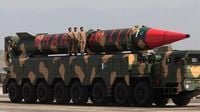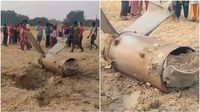In a significant escalation of tensions between India and Pakistan, India launched precision strikes against at least four airfields within Pakistan on Saturday, May 10, 2025. This military action was a direct response to a series of Pakistani drone raids and missile launches targeting Indian military and civilian infrastructures. The situation intensified following Pakistan's initiation of "Operation Bunyan ul Marsoos," which involved multiple drone incursions and missile threats.
On the same day, Pakistan attempted to strike New Delhi with its Fatah-II hypersonic ballistic missile, which was intercepted over Sirsa, Haryana, by India’s Barak-8 air defense system. This missile, known for its high speed and precision, was reportedly aimed at the Indian capital but was neutralized before it could reach populated areas. The Fatah-II missile, developed by Pakistan, has a range exceeding 400 kilometers and is designed for quick, tactical strikes with the capability to carry both conventional and tactical nuclear warheads.
According to the Ministry of Defence, drone activity was detected at 26 locations along the International Border and the Line of Control (LoC). These locations included Baramulla, Srinagar, Avantipora, Nagrota, Jammu, Ferozpur, and several others. An armed drone attack in Ferozpur resulted in injuries to a local family member, highlighting the immediate threat posed to civilians.
Earlier, on the night of May 7–8, India had successfully neutralized a large-scale drone and missile attack from Pakistan targeting several Indian military installations. In this operation, Indian forces reportedly destroyed a Pakistani air defense system located in Lahore, demonstrating a proactive approach to counter the escalating threats.
The Fatah-II missile, classified as hypersonic, travels at speeds exceeding Mach 5, making it extremely difficult to intercept without advanced air defense systems like India’s Barak-8. The missile is part of Pakistan's growing arsenal, which includes various other missiles such as the Shaheen-III, capable of reaching targets up to 2,750 kilometers away, and the Ghauri-II, which has a range exceeding 2,000 kilometers.
Pakistan's missile capabilities have raised concerns in Indian defense circles, prompting calls for strategic preparedness. The Fatah-II missile's operational use against New Delhi marks a significant shift in Pakistan's military strategy, as it represents a direct threat to the Indian capital. The Indian government has yet to issue a formal statement regarding this missile attack, but officials have reiterated that all air force installations are secure.
In response to the escalating situation, Indian forces launched retaliatory strikes targeting key airbases in Pakistan, including Nur Khan Airbase in Rawalpindi, Rafiqi Airbase in Shorkot, and Murid Airbase in Chakwal. These strikes were aimed at crippling Pakistan's military infrastructure and capabilities. Lt Gen Ahmad Sharif Chaudhry, spokesperson for Pakistan’s Inter-Services Public Relations (ISPR), confirmed that the Nur Khan and Rafiqi bases had been hit but described the damage as “limited.” He accused India of escalating the conflict and vowed a “measured but strong” response.
As the conflict intensifies, civilian life in border areas is being heavily disrupted. Reports indicate that power cuts and blocked highways have become commonplace in regions like Punjab and Rajasthan, with residents experiencing intermittent shelling. Schools and government offices within 100 kilometers of the border have been ordered to shut down until further notice, and mass evacuations have been reported in border villages.
In the wake of these developments, Indian defense forces have maintained a high state of alert, tracking aerial threats using counter-drone systems. Citizens in affected areas are being advised to remain indoors and follow safety instructions issued by local authorities.
The recent events underscore the precarious nature of India-Pakistan relations, with both nations poised for military action. The Fatah-II missile's interception is a testament to India's growing defense capabilities, but the ongoing drone threats and missile launches from Pakistan signal that tensions are far from resolved.
In summary, the situation remains critical as both countries navigate this dangerous escalation. The international community is watching closely, as the potential for further military engagements could have far-reaching consequences for regional stability in South Asia.






